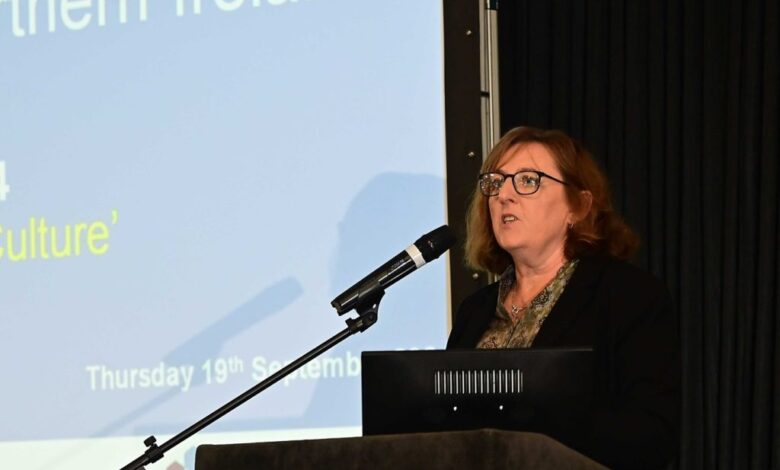Northern Ireland CNO sets out commitments for nurse education

The chief nursing officer (CNO) for Northern Ireland has outlined her commitments for nursing education and advanced practice, and has championed the profession to take the lead in public health, prevention and early intervention.
The comments have come as part of Maria McIlgorm’s annual CNO conference, which was held in Belfast this week.
“Patient safety, a sustainable workforce and staff wellbeing must be at the core of everything we do”
Maria McIlgorm
In her keynote address, Ms McIlgorm committed to investing in nursing and midwifery education.
“Understanding the educational requirements and training needs of nurses and midwives is key to an effective workforce which in turn ensures the provision of safe, effective high-quality care,” she said.
Ms McIlgorm noted that “significant work has been undertaken” this year to improve how post-graduate education is commissioned.
This will ensure the workforce can access the education they need “to maintain current services, to support transformation and meet the changing health needs of our population”, she said.
She noted that there were three “distinct career pathways” in nursing and midwifery – clinical, operational and education/clinical academic – and said it was important to align post-graduate education to these.
As such, Ms McIlgorm announced that she would be commissioning a new MSc advanced practice programme for nurses, midwives and allied health professionals (AHP).
She said this programme would include a “linked award” that would allow “scaffolding of modules” with different pathways that accommodate the unique route of a nurse, midwife or AHP undertaking advanced practice.
Ms McIlgorm told Nursing Times earlier this year that she was committed to growing the advanced nurse practitioner (ANP) workforce and embedding advanced practice across a range of clinical settings.
It comes as a report was published last year by the Department of Health in Northern Ireland, which put forward recommendations about how to expand the ANP role.
The CNO also said this week that she had commissioned the Northern Ireland Practice and Education Council to create a framework for mental health nursing.
This framework is set to be modelled on a similar learning disability nursing framework, which the government plans to launch in November this year.
Meanwhile, Ms McIlgorm noted that progress had been made around her five-year vision for nursing and midwifery in Northern Ireland.
The vision, unveiled at her inaugural CNO conference last year, focused on four key priority areas: workforce and workload planning, education and training, career pathways, and developing a quality assurance framework.
In her keynote address, Ms McIlgorm said: “Significant work has already progressed this year in all of our key priority areas.
“Many of you here today have been directly involved in taking this work forward and I would like to that this opportunity to thank you all for you invaluable contributions.
“Patient safety, a sustainable workforce and staff wellbeing must be at the core of everything we do. They are all inextricably linked.”
Separately, Ms McIlgorm warned that there were “significant health inequalities that persistent” in Northern Ireland.
“Many of our communities face barriers to health access and outcomes, with socio-economic factors playing a crucial role,” she said.
She noted that the population was getting older, with an increase in healthcare complexity, co-morbidity and frailty in this demographic group.
In addition, she cited rising levels of obesity, cancer and increased demands for palliative and end-of-life care.
“As professionals, collectively we can and will respond to these changing demands,” argued Ms McIlgorm.
“As nurses and midwives, you play a pivotal role in setting the direction and being part of the change you and our people want to see.
“Your expertise in both clinical care and patient advocacy put you in a key position to influence and deliver change.”
Nurses and midwives’ ability to build strong relationships “creates trust and confidence which are essential to address health inequalities”, the CNO continued.
“The collaborative efforts of nurses and midwives are crucial in addressing population health needs and achieving optimal health outcomes,” she said.
“By combining our unique expertise, we can provide comprehensive care that addresses the physical, emotional and social determinants of health.”
Also unveiled at the CNO conference was a new Collective Leadership Framework for Nursing and Midwifery.
The framework aims to create a culture across the professions which values acts of leadership from all staff, regardless of hierarchy, experience, location, discipline or level.
Ms McIlgorm welcomed the framework and said it would “ultimately translate into better outcomes for our workforce and the people who use our services”.






